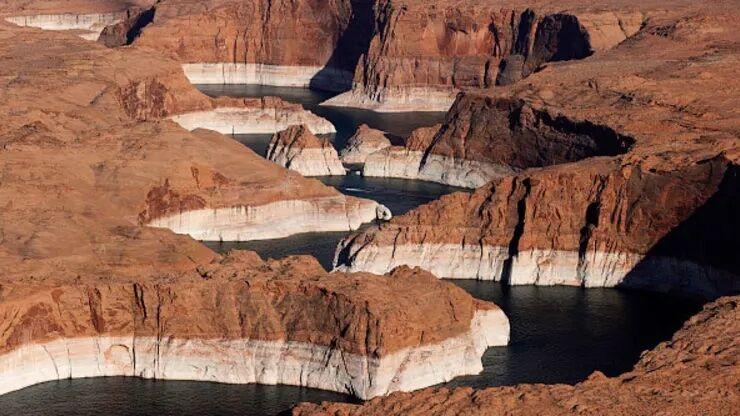Old timers who manage ditches, head gates, and canals often mention the “head of water.” It refers, somewhat imprecisely, to an amount of water needed to force its movement over various distances. A bigger hayfield requires a bigger “head of water” to irrigate it all the way to the bottom, and a bigger turbine at a hydroelectric dam requires a bigger “head of water” to spin it.
It’s interesting that the same root evolved into the phrase “coming to a head.” A dictionary of idioms defines the phrase as “reaching a point of intensity at which action must be taken.” As in, “things at the office finally came to a head, and he had to be fired.”
Three of my last four columns were about Colorado River issues, especially the dramatic drop in the water level at Lake Powell. We’ve discussed the Interstate Compacts, the government’s complicity in draining the lake, and a different approach Colorado and the Upper Basin should take. Why all the sudden focus on such a perennial issue? Because generational disputes over the River’s management are finally coming to a head. And the stakes could not be higher for Colorado.

Here is the critical situation. The Commissioner of the Bureau of Reclamation has delivered an ultimatum to the seven states that depend on the Colorado River, demanding they slash use of their own water – by millions of acre feet – or else. The amount of the total reduction would virtually equal Colorado’s entire share, and the states were given 60 days to come up with a plan. Otherwise, the Bureau threatens to thrust aside the Interstate Compact, ignore a century of western water law, and assume complete control of the allocation of water among the states.
The Bureau would say that is a gross exaggeration, yet it openly suggests that a drought this severe may require “uniting the Upper and Lower Basins” into a single entity – which would nullify the Compact – and managing the water as the federal government sees fit. That would jettison the traditional requirement that the Upper Basin deliver a set amount of water to the Lower Basin, eliminating the primary purpose of Lake Powell. The Commissioner could then deliver to each state however much water she decided, according to some yet-unexplained standard – and deliver it from Blue Mesa, Animas-La Plata, Ridgway, McPhee, Taylor Park, Vallecito, Flaming Gorge, Navajo, and any number other reservoirs the Bureau owns.
The Bureau and its allies would call that a “shameless exaggeration!” They would protest that many of those reservoirs have specific contracts with power and water providers, while others have different legal requirements. Animas-La Plata, for instance, was part of the Ute Indian Water Rights Settlement Act, so its water helps fulfil that purpose by law. Indeed, all of the Bureau facilities in the Colorado River system are administered in accordance with laws, interstate compacts, contracts, an international treaty, and numerous agreements, collectively referred to as “the Law of the River.” (My well-worn copy fills two thick three-ring binders.)
Isn’t that the point? The River and all its dams and reservoirs are governed by law – not by decrees from the current Commissioner of Reclamation. That agency owns the dams, but not the water behind them. Water belongs to the people of the states. It is allocated by agreements carefully worked out among them over a century of negotiations. I double-checked, and nothing in that entire body of law says “unless the Bureau decides otherwise because of a drought.” Indeed, the states spent years negotiating the current “drought contingency plan,” which does not expire until 2026. The Commissioner told Congress she wants to replace it now, but she has no authority to order states to do any such thing.
Every first-year law student knows altering a contract requires agreement of both parties. The Interstate Compact is a binding contract, agreed to by seven states, the U.S. Congress, and the President. If it is to be reinterpreted, as some of us advocate in light of the historic drought, those details must be worked out by the same parties – not the temporary occupant of an unelected Commissioner’s office.
I much prefer light-hearted, tongue-in-cheek columns. But this matters – this is for all the marbles.
Pressure is building; quickly coming to a head. Colorado must tell the Bureau, emphatically, that it will not permit a presumptuous bureaucratic edict to determine its water policy. Rather, the State must do whatever it takes to see that the Colorado River is administered according to law.




Comments on this entry are closed.